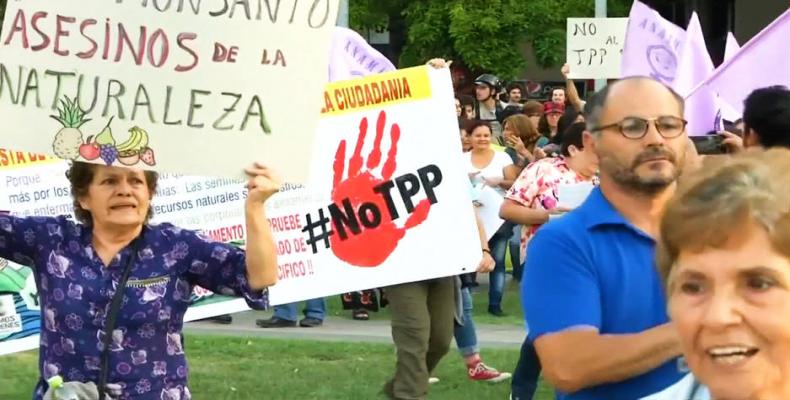Santiago de Chile, March 8 (RHC)-- Eleven foreign ministers have signed the Comprehensive and Progressive Agreement for Trans-Pacific Partnership (CPTPP) to slash tariffs among member nations by 2019.
Negotiations of the new trade deal between Australia, Brunei, Canada, Chile, Japan, Malaysia, Mexico, New Zealand, Peru, Singapore, and Vietnam moved along quickly since the document was first introduced by Chinese President Xi Jinping last November. These governments agreed on its content January 23 and by February 21 its 30 chapters were released to the public.
The pact, which will significantly cut import taxes on a variety of products and services traded among these countries, is being criticized by Australian unions and leftist parties in Chile and New Zealand for infringing on their respective national sovereignty.
The People’s Democratic Movement party of Chile said via Twitter the trade deal will be disastrous for small and medium-sized businesses and will give disproportionate power to multinational corporations that can, under the soon to be signed accord, sue individual member states in international courts.
The final version of the CPTPP is a revised Trans-Pacific Partnership (TPP) agreement that was signed in 2016 with the above countries, plus the United States. Just after his swearing in Jan. 2017, protectionist president Donald Trump withdrew the U.S. from the multinational trade agreement before it was implemented claiming it would hurt its workers and companies.
The CPTPP took out approximately 20 clauses from the TPP agreement, mainly over intellectual property regulations that had been demanded by the now absent U.S.
Chile’s top trade negotiator, Felipe Lopeandia, said that the group’s moving forward after Trump’s retreat will "send a political signal to the world and to the United States itself, that this is a global agreement."
The 11 remaining states represent 500 million people and 13.5% of the world’s gross domestic product - greater than the European Union. The multilateral commercial agreement goes into effect 60 days after it is ratified by six of the 11 member nations.
"The CPTPP will establish a new standard for other regional economic integration agreements, and even for future negotiations in the World Trade Organization and in Asia-Pacific Economic Cooperation," said Chile’s foreign ministry.
Even before the monumental trade agreement had been signed by these initial nations, there was talk that Britain, Thailand, Colombia, South Korea and Indonesia are considering joining the pact to liberalize their trade.
11 countries sign Trans Pacific Trade Deal in Chile

Articles en relation
Commentaires
Laissez un commentaire
Tous les champs sont requisPlus de visites
- Les États-Unis annoncent des restrictions en matière de visas liées à la coopération médicale internationale de Cuba
- Le chanteur populaire Paulo F.G. meurt dans un accident de voiture à La Havane
- Cuba : les migrants à Guantanamo sont une provocation et un affront à la souveraineté (+Photos)
- Le gouvernement cubain condamne les intentions des États-Unis concernant la base navale de Guantanamo
- Washington révoque la licence accordée à Chevron, "une décision nuisible et d'inexplicable"

